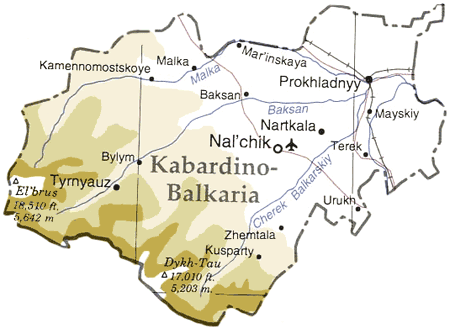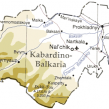
Kabardino-Balkaria: Another North Caucasus Hot Spot?
Publication: Eurasia Daily Monitor Volume: 6 Issue: 132
By:

Today, the northwestern part of the North Caucasus region (comprised of the republics of Kabardino-Balkaria, Karachaevo-Cherkessia and Adygeya) is increasingly becoming one large battlefield. An affluent resort area during the Soviet period, today the region attracts very few Russian visitors, primarily due to its instability. According to the most optimistic estimates, tourist traffic to the world-renowned ski resort of Dombai in Karachaevo-Cherkessia alone declined by 70-90 percent last winter (www.kavkaz-uzel.ru, December 31, 2008), and the number of foreign visitors substantially decreased. The summer season is unlikely to bring changes for the better, as the entire region is affected by the large-scale military drills that were conducted along the length of the border it shares with Georgia. Russian First Deputy Defense Minister Alexander Kolmakov described the current maneuvers as the largest in the area since the Soviet Union’s collapse (www.skavkaz.rfn.ru, May 19).
The Russian army in the region has its work cut out -the entire North Caucasus today is gripped by a wave of armed underground resistance. The insurgency operations in June forced Russia to change its message and admit the gravity of the situation in the region (www.gazeta.ru, June 22), and although the Russian leadership used to shy away from the term "rebels," today it is used routinely. Until now, the Russian government usually limited the number of its "problem republics" only to Dagestan, Chechnya and Ingushetia; however, Russian President Dmitry Medvedev has clearly signaled that this group consists of five regional republics, including Kabardino-Balkaria and Karachaevo-Cherkessia (www.korrespondent.net, June 25). Moreover, it seems that this latest list is not entirely accurate either, as it does not include the Republic of Adygeya, which is beginning to look more and more like all the other federal republics in early 2000. According to the Kavkaz Uzel website, "armed clashes, shootouts and diversionary acts in the North Caucasus during the first six months of 2009 resulted in at least 78 casualties among law enforcement personnel, 145 among the so-called rebels and 62 civilians" (www.kavkaz-uzel.ru, July 1).
The daily routine of news reports of assaults and explosions from Chechnya, Dagestan and Ingushetia (the northeastern part of the North Caucasus) usually did not extend to the northwestern part of the region (primarily Kabardino-Balkaria and Karachaevo-Cherkessia). Yet, the Yarmuk Jamaat fighters are now striking at a steady rate, and their raids can no longer be described as an exception to the rule.
The death of the 25-year old Karachaevo-Cherkessia native and reigning world sambo champion, Murad Ristov, who was the pride of Adygeyan, Cherkessian and Kabardinian youth, during a special forces operation in Nalchik on May 28, came as an unpleasant shock to the government, and was a clear indication that Yarmuk Jamaat’s popularity among the young people is climbing.
In reality, the Yarmuk Jamaat is no longer simply a militant group. It has become a fully-fledged network that counts within its ranks those who may not take an active part in the combat, but still support the jamaat in its opposition to government policies. This change represents a second transformation for Yarmuk -the first came when the Balkar Jamaat merged with ethnic Kabardinian and Cherkessian followers of Salafi ideology from Kabardino-Balkaria and Karachaevo-Cherkessia. The merger allowed Yarmuk to expand beyond the limits of the ethnically homogenous faction, and become a diverse group of followers whose primary alliances were based on geography rather than ethnicity. The credit for this change belongs to the then-military commander of Chechnya’s armed resistance Shamil Basaev, who founded jamaats across the region and personally oversaw all ethnic jamaats in the North Caucasus.
As time went on, Kabardino-Balkaria’s public gradually came to experience first-hand all the developments underway in the neighboring republics. A counter-terrorist operation regime was declared in nine towns of Prielbrussky district on June 30, the main declared objective was to liquidate potential members of the Yarmuk group (a shootout targeting policemen had taken place in the area on June 21). The site of the operation was chosen strategically because it was the most frequent location for insurgent strikes against law enforcement personnel. It is also worth noting that the site happens to be populated by ethnic Balkars, who have always sympathized with the Chechens and their struggle due to their shared experience of mass deportation during World War II. In contrast to Kabardins, Balkars are a Turkic language group permanently locked in a conflict for land with the former -an issue that is extremely important in the mountainous parts of the North Caucasus. Finally, the site of the operation was also the birthplace of Yarmuk, the jamaat that was formed by locals with the explicit goal of providing assistance to the Chechens in their struggle against Russia.
The leader of the Balkar elders’ council, Ruslan Babaev, criticized the counter-terrorist operation, expressing concern that the actions of both the insurgency and the law enforcement deprive locals of a chance to earn a living from tourism. Yet, the military called an end to the operation on July 2. While the military announced that sizable weapon caches had been found during the operation, the operation’s results were unimpressive -which was no surprise, given that the locals would not have handed over their Balkar compatriots to the government under any circumstances.
On July 2, a number of insurgents were reported to have been cornered in a residential building in the republic’s capital city, Nalchik. Yet, only a few hours later a man and a woman inside the building surrendered to the police without resistance (Interfax, July 2), which suggests that the couple may have sympathized with the rebels, but were not active fighters. It is extremely uncommon for the insurgents to surrender to the police during special operations.
The Yarmuk Jamaat will in all likelihood escalate its activities, and its fighters, following an internal restructuring, have already become a very serious problem for the Russian government. In the meantime, it is worth noting that the international human rights organization Amnesty International has criticized the human rights violations in the North Caucasus. The international NGO noted that the Russian government is using extra-legal methods in their counter-insurgency actions and commits serious violations of international law (Radio Liberty, June 10). The dismal state of human rights in the region is pushing more and more residents -and primarily young people- to support the rebels’ cause.




